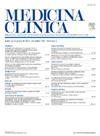Características de la insuficiencia tricúspide grave inducida por dispositivos de estimulación intracardiacos
IF 2.1
4区 医学
Q1 MEDICINE, GENERAL & INTERNAL
引用次数: 0
Abstract
Introduction and aims
Tricuspid regurgitation (TR) induced by the implantation of cardiac implantable electronic devices (CIED) is an increasingly common cause of severe TR. Our aim was to describe the echocardiographic phenotypic characteristics of CIED-induced severe TR.
Methods
Retrospective cohort study that included patients with severe TR related to CIED diagnosed in the cardiac imaging unit of a Spanish tertiary hospital.
Results
37 patients with severe TR induced by lead/electrode interference formed our study group. TR was predominantly severe (68%), followed by massive (21%) and torrential (11%). The leaflet most affected by the interference was the septal. 58% of the sample presented severe dilatation of the right atrium (RA) (mean RA area 28 cm2). Mean tricuspid annulus measurement was 42 mm. The usual parameters for quantifying RV systolic function were on average within the normal range (TAPSE mean 19 mm, S’ wave 10 mm, FAC 41%), while global RV strain (RVGLS -15%) and free wall strain (RVFWLS -19%) were found reduced. An incipient degree of ventricular/pulmonary arterial uncoupling was evident (mean TAPSE/PSAP 0.34, SGLVD/PSAP 0.27%/mmHg).
Conclusions
Our patients with CIED-induced severe TR are characterized by a heterogeneous phenotype with a high prevalence of severe RA and tricuspid annulus dilatation. RVGLS, RVFWLS, and arterial ventricular coupling were the most sensitive parameters for early assessment of RV systolic dysfunction.
心内起搏装置诱发严重三尖瓣反流的表型。
导言和目的:植入心脏植入式电子装置(CIED)引起的三尖瓣反流(TR)是导致严重TR的一个日益常见的原因。我们的目的是描述 CIED 引起的严重 TR 的超声心动图表型特征:方法:回顾性队列研究,纳入西班牙一家三甲医院心脏影像科诊断的与 CIED 相关的严重 TR 患者:37名因导联/电极干扰而诱发严重TR的患者组成了我们的研究小组。TR以重度为主(68%),其次是大面积(21%)和暴发性(11%)。受干扰影响最大的是室间隔心叶。58%的样本显示右心房(RA)严重扩张(RA平均面积为28平方厘米)。三尖瓣环的平均测量值为 42 毫米。量化左心室收缩功能的常规参数平均在正常范围内(TAPSE平均值19毫米,S波10毫米,FAC 41%),而整体左心室应变(RVGLS -15%)和游离壁应变(RVFWLS -19%)均有所降低。心室/肺动脉未耦合的初期程度明显(平均TAPSE/PSAP为0.34,SGLVD/PSAP为0.27%/mmHg):结论:CIED诱导的重度TR患者具有异质性表型,重度RA和三尖瓣环扩张的发生率较高。RVGLS、RVFWLS和动脉心室耦合是早期评估RV收缩功能障碍最敏感的参数。
本文章由计算机程序翻译,如有差异,请以英文原文为准。
求助全文
约1分钟内获得全文
求助全文
来源期刊

Medicina Clinica
医学-医学:内科
CiteScore
3.10
自引率
5.10%
发文量
295
审稿时长
22 days
期刊介绍:
Medicina Clínica, fundada en 1943, es una publicación quincenal dedicada a la promoción de la investigación y de la práctica clínica entre los especialistas de la medicina interna, así como otras especialidades. Son características fundamentales de esta publicación el rigor científico y metodológico de sus artículos, la actualidad de los temas y, sobre todo, su sentido práctico, buscando siempre que la información sea de la mayor utilidad en la práctica clínica.
 求助内容:
求助内容: 应助结果提醒方式:
应助结果提醒方式:


